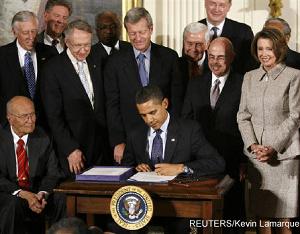Our Rights and the Constitution
 | | This is a short list of the only things the government is allowed to get away with; it's a pretty important list |
In the United States today, it seems that we, the people, have forgotten what it means to have rights. Over the last two centuries, politicians and educators have gotten it wrong so often that we now talk about things like a right to universal healthcare or a right to life (in terms of abortion) as if these are things that can only be given to us by the law. Sadly, this is exactly the opposite of what our founding fathers obviously intended, and if this kind of thinking is allowed to persist, we might as well throw our constitution away.
In order to understand what the intention of the Constitution is, look no further than the preamble:
We the People of the United States, in Order to form a more perfect Union, establish Justice, insure domestic Tranquility, provide for the common defence, promote the general Welfare, and secure the Blessings of Liberty to ourselves and our Posterity, do ordain and establish this Constitution for the United States of America.
It is important to note that the subject of that sentence is "We the People" not "We the Government." It is the people who establish tranquility for themselves and secure the blessings of liberty. We, not they. Granted, all the preamble really says is "We the People...establish this Constitution," so one could argue that the people who wrote the constitution had the intent of creating a government that could provide all of the things listed. Indeed, this is a fairly popular interpretation amongst modern, mainstream politicians (regardless of party), who believe that they have the obligation to provide the needs of the people.
However, the Constitution also says this:
The powers not delegated to the United States by the Constitution, nor prohibited by it to the States, are reserved to the States respectively, or to the people.
In other words, if the Constitution does not grant the federal government the power to do something, then that power rests in the hands of state law or in the hands of the people. This clearly implies that the intention of the Constitution was not to outline what the people can and cannot do, but to expressly enumerate what the government can do. It does not say what the government is not allowed to do, because it clearly states that these are the only powers given to the government; if it's not outlined in the Constitution, the government can't do it.
 | | That's correct: you have a right to cleavage, even if the Constitution doesn't expressly say it. God bless America! |
I'll repeat that. If it's not in the Constitution, the government can't do it. Period.
Lest we forget, our founding fathers believed that every individual was born with inalienable rights that are given by a "Creator" and not by an old document or room full of powerful men. These rights are the things that the government is not allowed to take away by force of law, and they include life, liberty, and property.
The first inalienable right in the list is pretty simple: life. The government does not have the power to take away your life, as long as you are a law-abiding citizen of this country.
The second inalienable right is arguably the most important: liberty. According to almost every dictionary you can find, "liberty" is defined as the freedom to choose. The Constitution, specifically the Bill of Rights, elaborates on the meaning of the word by listing the things we can choose, such as our religion, our beliefs, our speech, our press, our counsel, etc.
The third inalienable right is much simpler, but also crucially important: property. The government does not have the power to take away the things that you own. Your land, your belongings, and many of those same things listed in the Bill of Rights all count as property.
There's also the pursuit of happiness mentioned in the Declaration of Independence, which can be interpreted however you like. The bottom line is this line, taken from the Ninth Amendment to the Constitution:
The enumeration in the Constitution, of certain rights, shall not be construed to deny or disparage others retained by the people.
Therefore, it makes no sense to talk about a right to universal healthcare or a right to life when it comes to abortion. Universal healthcare is something that can only be given to us by the government, but it comes at the price of liberty, as it precludes the possibility of choice (and don't give me any of that crap about the public option encouraging competition; that's a fool's belief). Similarly, to demand that the government pass laws banning abortion because unborn babies have a right to life makes no sense. We have freedoms by virtue of simply being alive, and there is no way the federal government can give us more by creating bigger programs, passing more restrictive laws, or spending more money.
 | | "'This law shall take power away from the government and give it back to the people.' They'll buy that, right?" |
The only way we can be given more freedom is if the government were to repeal laws, end programs, and spend less. It is that simple. Unfortunately, the most predictable side effect of power is the fact that the powerful never willingly give up what they have earned. This is true of the government, as it has continued to grow and grow despite the very clear restrictions of the United States Constitution. We, the people, it seems, are the ones willing to lose our freedoms and have our rights infringed, but we have nobody to blame but ourselves. The government only has as much power as we have given it.
We wrote our constitution for a reason, and yet most of us seem to have forgotten what that reason was. I will leave you with a quote from our sitting president on the matter:
"Generally, the Constitution is a charter of negative liberties. Says what the states canít do to you. Says what the Federal government canít do to you, but doesnít say what the Federal government or State government must do on your behalf." -Barack Obama, 2001
You can decide for yourself whether he's right or wrong and what that means for the future of this nation.
-e. magill 12/15/2009
|
|